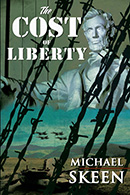
 |
How could it have all come down to this? For Don Ladner, the dreamlike success and security of his appointment less than two years ago as White House Chief of Staff in the administration of President T.J. Samuels had descended into an unimaginable nightmare. Now, instead of standing at the side of arguably the most powerful political figure on the planet, he was being interrogated like a criminal by a representative of the Islamic Caliphate, and the country he had once served in the role of Samuels' right-hand man was possibly no more. Could the global map really have been redrawn so rapidly, with Russia, China, and the Islamic Caliphate now in charge of most of the world?
After this disturbing beginning, the author rewinds the clock to a year earlier and the aftermath of events chronicled in his 2014 thriller, The Cost of Freedom. The United States is reeling from a devastating electromagnetic pulse (EMP) attack launched by Iran that has crippled much of the electrical infrastructure nationwide. When a planned retaliatory nuclear strike against Tehran fails, President Samuels has a change of heart about an "eye for an eye" approach and orders the bulk of America's forces back to protect the homeland. Meanwhile, in an obviously well-coordinated play for power, Russia and China go on the attack in other parts of the world while forces of the Islamic Caliphate take advantage of the chaos caused by the EMP to cross into the continental United States and work with cells that have infiltrated the country previously to stage a takeover. On the run and with his nation nearing collapse, will Samuels go down in history as the last U.S. President?
In his suspenseful and fast-paced novel, Skeen once again looks at the world's current political landscape and speculates how it can rapidly change. Like writers Joel C. Rosenberg and Tom Clancy, he is keenly aware of the tensions among countries and ideologies that could lead quickly to calamity; but rather than being satisfied with the dodging-a-bullet stories that these popular novelists tend to produce, he takes them one step further, in the vein of authors such as Rick Ainsworth, by describing a future where the unthinkable actually occurs. The result is as much a cautionary tale as it is a thriller. Part of the way Skeen achieves this first aspect is by loosely disguising real figures with political ones. The most obvious example of this is in the character of Vladimir, the "Emperor" of Russia who fits the image many Americans have of Vladimir Putin. The author liberally uses the names of other well-known government officials such as O'Connor, Hillary, and McCain in his story, as well. However, the characters he associates with these appellations do not hold the same positions as their namesakes nor clearly resemble them, so one wonders if perhaps he is just having a bit of fun with his narrative in these cases.
Skeen's riveting tale of an embattled America is sure to keep fans of political thrillers flipping the pages. Periodic grammar and usage errors might distract some from the power of the book. But perhaps more importantly, the speculations that drive this plot may cause his readers to take a closer look at current events.